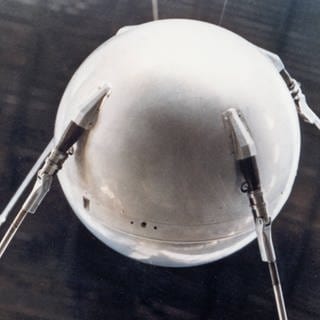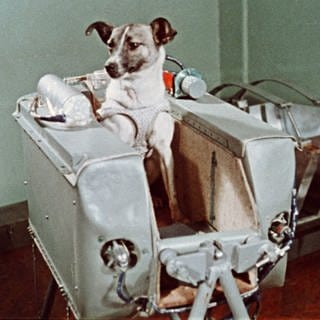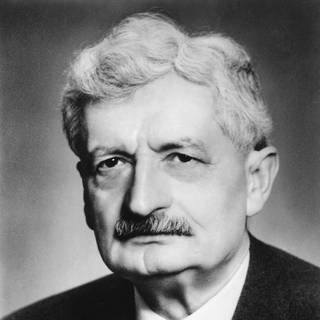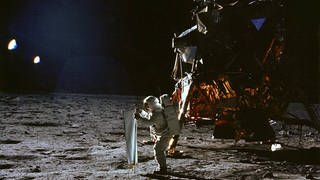Apollo 8 war in vielerlei Hinsicht eine besondere Mission. Es war der erste bemannte Flug zum Mond. Bis dahin hatte sich noch kein bemanntes Raumschiff weiter als 1.500 Kilometer von der Erde entfernt.
Die drei Astronauten Frank Borman, William Anders und James Lovell betraten zwar nicht den Mond – diesen Schritt sollte erst Neil Armstrong ein halbes Jahr später gehen – aber sie umkreisten ihn zehnmal.
Heiligabend 1968 knipsen die Astronauten ein Foto, das die Welt verändern sollte: Im Vordergrund der kahle graue Mond, im Hintergrund die aufgehende blauweiße Erde – die erste Weltraumperspektive auf unseren Planeten.
Mitschnitt der Astronauten-Unterhaltung
Da ein Aufnahmegerät die Bord-Gespräche mitschnitt, ist der Moment, als sie die Erde erstmals sehen, auch akustisch erhalten geblieben. Die Aufnahme beginnt damit, dass Borman eine Drehung des Raumschiffs ankündigt, denn die Astronauten sind gerade dabei, die Mondoberfläche in Schwarzweiß zu fotografieren und müssen dazu das Raumschiff etwas justieren. Man hört, wie sie sich über einen Krater auf dem Mond unterhalten, und ob der möglicherweise vulkanischen Ursprungs ist.
Den Farbfilm zum Glück nicht vergessen
Durch die Drehung kommt Apollo 8 mit einem Mal in eine Position, in der die Erde durch ein Fenster sichtbar wird. Ab dann hört man die Begeisterung. Man hört, wie Bill Anders zu Jim Lovell sagt, er solle ihm schnell den Farbfilm reichen. Lovell sagt erst: "Mach viele Fotos!" Und dann: "Komm, gib mir die Kamera." Anders: "Beruhige dich."
Schöpfungsgeschichte als Weihnachtsbotschaft
Dreieinhalb Stunden vor diesem unerwarteten Ereignis gab es noch eine Live-Schalte zur Erde, die im Fernsehen übertragen wurde. Es war ja Weihnachten. Und so beginnt Bill Anders, als Weihnachtsbotschaft die biblische Schöpfungsgeschichte zu verlesen. Jim Lovell und Frank Borman schließen sich an. – Genesis 1, Verse 1-10:
1 In the beginning God created the heaven and the earth.
2 And the earth was without form, and void; and darkness was upon the face of the deep. And the Spirit of God moved upon the face of the waters.
3 And God said, Let there be light: and there was light.
4 And God saw the light, that it was good: and God divided the light from the darkness.
5 And God called the light Day, and the darkness he called Night. And the evening and the morning were the first day.
6 And God said, Let there be a firmament in the midst of the waters, and let it divide the waters from the waters.
7 And God made the firmament, and divided the waters which were under the firmament from the waters which were above the firmament: and it was so.
8 And God called the firmament Heaven. And the evening and the morning were the second day.
9 And God said, Let the waters under the heaven be gathered together unto one place, and let the dry land appear: and it was so.
10 And God called the dry land Earth; and the gathering together of the waters called he Seas: and God saw that it was good.
And from the crew of Apollo 8, we close with good night, good luck, a Merry Christmas – and God bless all of you, all of you on the good Earth.
5.10.1957 Der Satellit Sputnik schockt den Westen
5.10.1957 | 1955 kündigt US-Präsident Eisenhower den ersten Satelliten im All an. Doch 1957 dann der Sputnik-Schock: Die UdSSR gewinnt im Space Race. Die Signale ihres Satelliten Sputnik sind auch im Westen zu empfangen.
Sputnik-Schock bis Challenger-Katastrophe Große Ereignisse der Raumfahrt
Die Mondlandung 1969 war der Endpunkt einer rasanten technischen Entwicklung – und eines erbitterten Wettstreits der Großmächte im Kalten Krieg. Als 1957 die Sowjetunion mit "Sputnik" den ersten Satelliten in den Weltraum brachte, fühlten sich die USA herausgefordert. Raketeningenieur Wernher von Braun spricht 1959 sehr explizit von der politisch-militärischen Bedeutung der Raumfahrt.




